
Edward Payson Allen was a politician from the U.S. state of Michigan. He served two terms in the United States House of Representatives from 1887 to 1891.

Henry Winter Davis was a United States Representative from the 4th and 3rd congressional districts of Maryland, well known as one of the Radical Republicans during the Civil War. He was the driving force behind the abolition of slavery in Maryland in 1864, and it was largely because of him that Maryland did not secede.

The 1864–65 United States House of Representatives elections were held on various dates in various states between June 5, 1864, and November 7, 1865, in the midst of the American Civil War and President Abraham Lincoln's reelection. Each state set its own date for its elections to the House of Representatives. Members were elected before the first session of the 39th United States Congress convened on December 4, 1865, including the at-large seat from the new state of Nevada, and the 8 from Tennessee, the first secessionist state to be readmitted. The other 10 secessionist states had not yet been readmitted, and therefore were not seated.

The 38th United States Congress was a meeting of the legislative branch of the United States federal government, consisting of the United States Senate and the United States House of Representatives. It met in Washington, D.C. from March 4, 1863, to March 4, 1865, during the last two years of President Abraham Lincoln's first term in office. The apportionment of seats in the House of Representatives was based on the 1860 United States census. The Senate had a Republican majority, and the House of Representatives had a Republican plurality.

The 39th United States Congress was a meeting of the legislative branch of the United States federal government, consisting of the United States Senate and the United States House of Representatives. It met in Washington, D.C., from March 4, 1865, to March 4, 1867, during Abraham Lincoln's final month as president, and the first two years of the administration of his successor, Andrew Johnson.
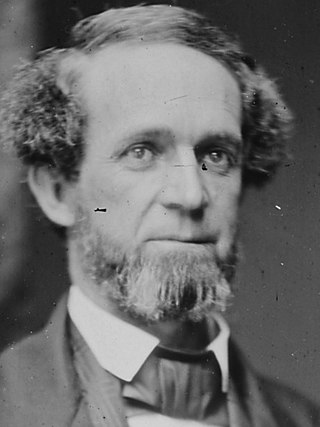
George Washington Jones was an American politician who represented Tennessee's fifth district in the United States House of Representatives. He served in the Confederate States Congress during the American Civil War.
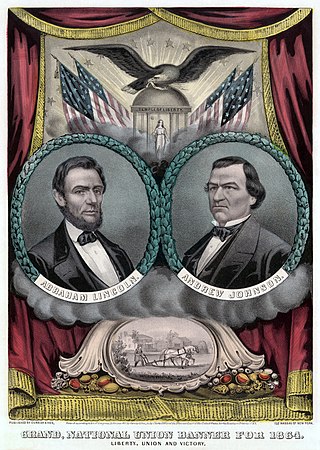
The National Union Party was the name used by the Republican Party and elements of other parties for the national ticket in the 1864 presidential election during the Civil War. Most state Republican parties did not change their name. The name was used to attract War Democrats, border state voters, and Unconditional Unionist, and Unionist Party members who might otherwise have not voted for Republicans. The National Union Party nominated incumbent Republican President Abraham Lincoln of Illinois and Democrat Andrew Johnson of Tennessee for Vice President. They won the Electoral College 212–21.

George Michael Decker Hahn, was an attorney, politician, publisher and planter in New Orleans, Louisiana. He served twice in Congress during two widely separated periods, elected first as a Unionist Democratic Congressman in 1862, as a Republican to the U.S. Senate in 1865, and later as a Republican to the U.S. House of Representatives in 1884. He was elected as the 19th Governor of Louisiana, serving from 1864 to 1865 during the American Civil War, when the state was occupied by Union troops. He was the first German-born governor in the United States, and is also claimed as the first ethnic Jewish governor. By that time he was a practicing Episcopalian.
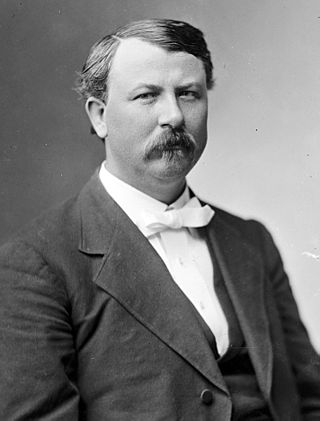
William Henry Calkins was an American lawyer and Civil War veteran who served four terms as a U.S. Representative from Indiana from 1881 to 1884.
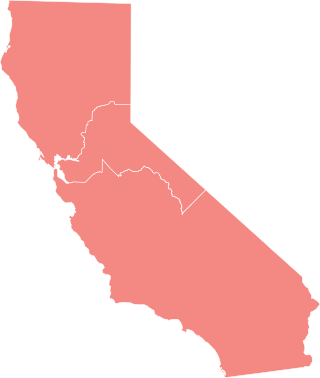
The United States House of Representatives elections in California, 1864 were elections for California's delegation to the United States House of Representatives, which occurred as part of the general election of the House of Representatives on November 8, 1864. California's all-Republican delegation was unchanged. This was the first election in which California was divided into districts. Formerly, all three seats were elected at-large.

The 1864–65 United States Senate elections were held on various dates in various states. They occurred during the American Civil War and Abraham Lincoln's re-election. As these U.S. Senate elections were prior to the ratification of the Seventeenth Amendment in 1913, senators were chosen by state legislatures. Senators were elected over a wide range of time throughout 1864 and 1865, and a seat may have been filled months late or remained vacant due to legislative deadlock. In these elections, terms were up for the senators in Class 2.

An election to the United States House of Representatives was held in Florida for the 39th Congress on November 29, 1865, shortly after the end of the Civil War.
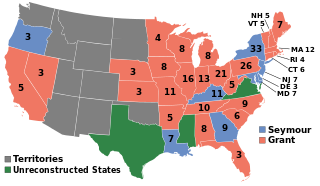
The 1868 United States elections was held on November 3, electing the members of the 41st United States Congress. The election took place during the Reconstruction Era, and many Southerners were barred from voting. However, Congress's various Reconstruction Acts required southern states to allow Black men to vote, and their voting power was significant to the elections results.
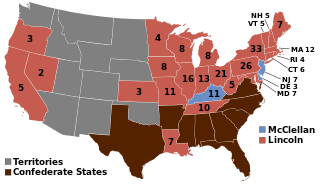
The 1864 United States elections were held on November 8, 1864. National Union President Abraham Lincoln was elected to a second term, while the Republicans added to their majorities in Congress. The elections were held during the American Civil War. Lincoln would be assassinated shortly into his second term.

The 1866 United States elections occurred in the middle of National Union/Democratic President Andrew Johnson's term, during the Third Party System and Reconstruction. Johnson had become president on April 15, 1865, upon the death of his predecessor, Abraham Lincoln. Members of the 40th United States Congress were chosen in this election. As this was the first election after the Civil War, many ex-Confederates were barred from voting, and several Southern states did not take part in the election. Delegations from Arkansas, Florida, Alabama, North Carolina, Louisiana, and South Carolina were re-admitted during the 40th Congress.

The 1864 United States presidential election in Michigan took place on November 8, 1864, as part of the 1864 United States presidential election. Voters chose eight representatives, or electors, to the Electoral College, who voted for president and vice president.

The 1863 Confederate States House of Representatives election in Florida was held on Wednesday, November 4, 1863 to elect the two Confederate States Representatives from the state of Florida, one from each of the state's congressional districts, to represent Florida in the 2nd Confederate States Congress. The election coincided with the elections of other offices, including various state and local elections.
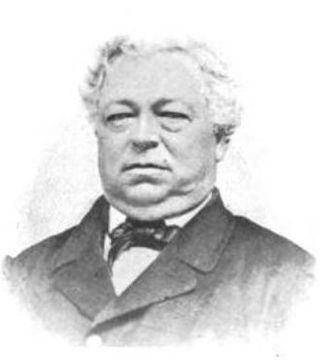
The 1864 New Hampshire gubernatorial election was held on March 8, 1864.